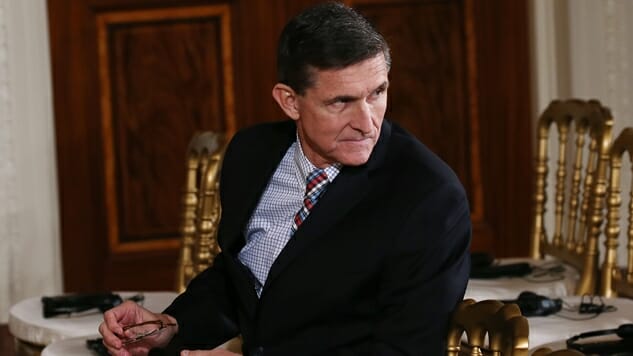11 Questions about Michael Flynn’s Resignation from the Trump Administration
Photo by Mario Tama/Getty
Last night, Michael Flynn, Donald Trump’s National Security Advisor, became his former National Security Advisor. If you’re not familiar with the saga, here is the timeline of events leading up to his resignation.
– On December 29th of last year, the Obama administration announced a fresh round of sanctions on Russia for their attempt to intervene in the 2016 election.
– That very same day, Michael Flynn conducted a phone call with Sergey Kislyak—the Russian ambassador to the U.S.—which caught the attention of the intelligence community during routine surveillance of Russian officials. This phone call is the centerpiece of the tale (as far as we know right now).
– On January 10th, Buzzfeed released the infamous dossier compiled by former MI6 agent Christopher Steele, which alleged cooperation between the Trump campaign and the Kremlin to take down Hillary Clinton.
– On January 12th, Paul Wood of the BBC reported that the FISA court issued a warrant to investigate two Russian banks implicated in the alleged plot to influence the election. Two applications for a wider scope of surveillance were rejected in June and July before a more narrowly drawn one was granted by a new judge. The BBC also reported that:
A lawyer—outside the Department of Justice but familiar with the case—told me that three of Mr Trump’s associates were the subject of the inquiry. “But it’s clear this is about Trump,” he said.
I spoke to all three of those identified by this source. All of them emphatically denied any wrongdoing. “Hogwash,” said one. “Bullshit,” said another. Of the two Russian banks, one denied any wrongdoing, while the other did not respond to a request for comment.
– On January 13th, the Wall Street Journal and other outlets reported on the investigation, and White House Press Secretary Sean Spicer said:
“The call centered around the logistics of setting up a call with the president of Russia and the president-elect after he was sworn in, and they exchanged logistical information on how to initiate and schedule that call. That was it, plain and simple.”
– According to Mike Pence, on January 14th, Michael Flynn told him that he did not discuss sanctions with Kislyak, and the next day Pence told Fox News:
“I talked to General Flynn yesterday, and the conversations that took place at that time were not in any way related to the new U.S. sanctions against Russia or the expulsion of diplomats.”
– On January 22nd, White House spokeswoman Sarah Sanders said “We have absolutely no knowledge of any investigation or even a basis for such an investigation.”
– On February 8th, Michael Flynn told The Washington Post twice that he did not discuss sanctions with Kislyak.
– On February 9th, a spokesman for Flynn said “While he had no recollection of discussing sanctions, he couldn’t be certain that the topic never came up.”
– On February 10th, Donald Trump said that he didn’t know about the report.
Here is that video of Donald Trump on Friday pretending he didn’t know anything about the Flynn/Russia controversy. pic.twitter.com/j09OSEbGBh
— CAP Action (@CAPAction) February 14, 2017
– On February 13th, The Washington Post reported that former acting Attorney General Sally Yates told the White House counsel that Flynn was vulnerable to Russian blackmail a month ago.
– Later that night, Michael Flynn resigned, stating that he:
“inadvertently briefed the Vice President Elect and others with incomplete information regarding my phone calls with the Russian ambassador. I have sincerely apologized to the president and the vice president.”
![]()
Here’s the tl;dr version of the past six weeks: the intelligence community kept the media in the loop about this investigation beginning in early January, and the Trump administration lied about their knowledge of it until it was too obvious to refute. So in that sense, here are 11 questions I have about this saga.
1. What did Donald Trump know when he tweeted this, the day after Flynn’s call with Kislyak?
Great move on delay (by V. Putin) – I always knew he was very smart!
— Donald J. Trump (@realDonaldTrump) December 30, 2016
Aside from the fact that Trump is a pathological liar and never deserves the benefit of the doubt, let’s assume for the second that he’s a normal politician and give him the benefit of the doubt that he did not know about Flynn’s conversation about sanctions when he praised Putin for not retaliating in kind (like the Kremlin typically does in these instances). Had the White House not lied about this investigation every step of the way, this could be dismissed as just another meaningless tweet. However, given that it came the day after the phone call in question, combined with the fact that Trump has categorically denied knowledge of this investigation despite a multitude of reports suggesting otherwise, it’s difficult to see how this tweet is not related to Flynn’s phone call about potentially dropping sanctions.
2. Did the White House counsel leave Trump out of the loop on this?
This is a pretty unfathomable reality to ponder given that the entire existence of the White House counsel is to…well…counsel the president. But we exited reality a long time ago, so it’s not entirely out of the question that Trump’s lawyers intentionally left him out of the loop in order for him to maintain plausible deniability.
3. How in the world can the White House say they were aware of this now?
In The Washington Post‘s story last night, they reported that:
A senior Trump administration official said before Flynn’s resignation that the White House was aware of the matter, adding that “we’ve been working on this for weeks.”
So to recap: three Trump administration officials who were implicated in this investigation said the report was “bullshit” and “hogwash.” Sarah Sanders said they didn’t even know about a basis for the investigation, Pathological Lying Spice said the call centered around logistics, and Donald Trump claimed to not know what the hell the press was talking about on Friday, but a senior official said that “we’ve” been working on this for weeks. Sure. Nothing fishy here.
4. Was Flynn fired, or did he actually resign?
Per The Washington Post
“One senior White House official said that Trump did not fire Flynn; rather, Flynn made the decision to resign on his own late Monday evening because of what this official said was ‘the cumulative effect’ of damaging news coverage about his conversations with the Russian envoy.”
In less than a week, Michael Flynn went from “How in the world can you accuse me of something I clearly didn’t do?” to “Well I guess I did it, I’m out. Peace.” Even in our news cycle that operates at hyperspeed, this is quite the evolution to make on your own. Especially given Flynn’s reputation for going rogue, earning him the nickname “firehose,” meaning that “unless held firmly to a task, Flynn would spray off dangerously in all directions.”
5. What does this mean for the FBI’s investigation into Trump’s ties with Russia?
I don’t know about you, but if I were investigating the president for potential collusion with Russia, and his National Security Advisor resigned over misleading the vice president about his potential collusion with a Russian ambassador, I’d sure want to have a chat with him. This may just be the beginning of The Story.
6. Will Congress investigate Michael Flynn?
This is perhaps the most impactful question in all of this given that the FBI operates underneath Donald Trump. Congress has subpoena power, and can pretty much use it at will in a case like this. Despite that, Jason Chaffetz—professional Benghazi hunter—said this morning that the House Oversight Committee will not pursue an investigation.
Chaffetz says investigation of Flynn is “taking care of itself.” Says further investigation is purview of intel committee not oversight.
— Kyle Cheney (@kyledcheney) February 14, 2017
Senator Orrin Hatch went even further:
.@SenOrrinHatch says Flynn resignation doesn’t “deserve” investigation. “I think highly of him, he’s a hero of this country for many years”
— Jacqueline Klimas (@jacqklimas) February 14, 2017
The House Intel chair said they will conduct an investigation, just not into Flynn.
House Intel Chair @DevinNunes says Cmte will look into IC leaks of Flynn/Russia call.
— Jake Tapper (@jaketapper) February 14, 2017
When the presumptive Democratic nominee was tangentially connected to the tragedy in Benghazi, Republicans in Congress moved heaven and earth to find a way to prosecute her. Yet when our National Security Advisor resigns and admits to misleading the vice president about his conduct with a foreign government, their response is to simply shrug their shoulders, call him a hero, and go after the intelligence community for leaking information about someone on their team.
The legacy of the modern Republican party will be cementing America as a banana republic. We’ve always had a two-tiered justice system for the well-off and everyone else, but this type of open politicization of our laws is the type of shit you see in countries that America typically invades. History will judge the Jason Chaffetz’s of the world as traitors to our common cause. Luckily, not all Republicans value their party more than their country like Chaffetz does, as Roy Blunt and Lindsey Graham have already seemingly come out in favor of an investigation. This could be the fight that finally breaks the Republican Party in two.
.@LindseyGrahamSC sure seems to support a Flynn investigation. Says Congress should get to read transcripts. pic.twitter.com/oKEtY3CHsf
— Eric Geller (@ericgeller) February 14, 2017
According to Republican Chris Collins—a member of the Trump transition team—the rest of the brave souls in the Republican Party like Mitch McConnell and Paul Ryan are keeping quiet because it’s Valentine’s Day. This party is beyond parody.
Cuomo: Why is the GOP so quiet on Flynn?
Collins: “Well, it’s Valentine’s Day and I guess they’re having breakfast with their wives” pic.twitter.com/ozf3GQnZSD— CNN Politics (@CNNPolitics) February 14, 2017
7. Does the White House tell Kellyanne Conway anything?
Roughly seven hours before Michael Flynn announced his resignation, Conway said Trump has “full confidence” in Flynn:
Wow— here’s the video of Conway saying Flynn has ‘full confidence’ of Trump. pic.twitter.com/gU4NsXgmKR
— Kyle Griffin (@kylegriffin1) February 13, 2017
This morning, Matt Lauer (Matt Lauer!!!!) roasted Conway on a spit, in an interview that was a trainwreck even by Conway’s aggressively low standards.
10 points for Matt Lauer. https://t.co/psatYnhwKS
— Jason Carlos (@jaarlos) February 14, 2017
8. How can anyone still believe that Wikileaks isn’t an appendage of the Kremlin?
Trump’s National Security Advisor Michael Flynn resigns after destabilization campaign by US spies, Democrats, press https://t.co/vKlX1Tqek1
— WikiLeaks (@wikileaks) February 14, 2017
I genuinely feel bad for you if you can’t see the obvious fact that at some point, Wikileaks pivoted from exposing government malfeasance to exposing Western government malfeasance.
9. Why did Russia Today (RT)—the Kremlin’s propaganda network—delete this tweet?
RT America deleted the tweet where they said Michael Flynn had “retired,” so I took a screenshot. pic.twitter.com/13bUtVL9Ak
— Dumb Idiot Riley Fox (@riley_fox) February 14, 2017
“Retired” is quite the choice of words for someone who was on the job for 24 days. This could be passed off as a simple mistake by a social media intern, but remember Flynn’s bumbling response to Yahoo‘s Michael Isikoff as to whether he was paid by the Kremlin?
Yeah, not a great look all around.
10. Does Paul Manafort—another senior Trump official who resigned over ties to the Kremlin—still have influence in the White House?
CNN reported in December that Manafort was helping with the transition. It’s unclear whether he still has control within the administration, but given his extensive career in Washington as a lobbyist, the fact that Trump quietly brought him back into the fold in December, and now Flynn’s resignation—it’s open season to find as many Russian connections in the White House as we can. Flynn is the third Trump official to resign over ties to the Kremlin, as Carter Page—who was a complete unknown before being crowned by America’s new Boy King—quietly resigned during the campaign. Last September, Julia Ioffe compiled a litany of damning quotes about Page in Politico:
“What’s this guy’s name?” says one former Western energy CEO who spent years in Russia, and would have overlapped there with Page.
“I had not heard of Carter Page before it came out in the media,” says another prominent Western businessman who has worked in the former Soviet Union for over two decades. “But I am getting a lot of emails from friends asking, ‘Have you heard of this guy?’”
“Strangely, I’ve never heard of Carter Page until this Trump connection,” Bill Browder responded to me in an email. He was one of the biggest Western players in the Russian [oil] market until President Vladimir Putin turned on him and Browder became his fierce critic. “It’s odd, because I’ve heard of every other financier who was a player on Moscow at the time.”
“He’s an extremely well-informed, authoritative expert on Russia,” says Mikhail Leontiev, a pro-Kremlin talking head and spokesman for Rosneft, Russia’s state oil giant. “People really respect him in this industry. He’s a very serious guy, and he has a good reputation.”
If you’re one of those people who have continually dismissed this Russia story as nothing more than 21st century McCarthyism (looking at you Glenn Greenwald), please explain how three high-level advisers have already resigned over ties to Russia. Either this is the most effective witch hunt in recent memory, or there’s at least a small fire raging beneath the plumes of smoke billowing out of Trump Tower.
11. How will the White House pivot?
I think we have a clue, and it is a familiar trope in Washington.
The real story here is why are there so many illegal leaks coming out of Washington? Will these leaks be happening as I deal on N.Korea etc?
— Donald J. Trump (@realDonaldTrump) February 14, 2017
No matter the administration, powerful officials in Washington have always condemned leaks. That is, unless it comes from them in order to advance their agenda (ie: the Iraq War). This is how the government pivoted after Edward Snowden’s leaks exposed the NSA as a constitution-sized paper shredder, and all the usual players are following suit. American state television clearly got the same set of talking points that Trump and Wikileaks are operating off of, as Steve Doocy got on all fours to lick Kellyanne Conway’s boots this morning:
Steve Doocy is deeply worried the @washingtonpost report about Sally Yates and Michael Flynn was made public. Kellyanne Conway thanks him. pic.twitter.com/ztkJUwUio2
— John Whitehouse (@existentialfish) February 14, 2017
Bottom line: Michael Flynn does not resign unless
A. The reports are true, and the administration was genuinely in the dark about his conversations with Russian ambassador(s). Which, given the series of statements sourced above, seems impossible.
B. The reports are true, the Trump administration was in the loop, and now needs to distance themselves from this story.
C. There’s more to this tale.
Given how many “coincidences” Trumplandia has with Russia, I’m leaning towards C. Buckle up folks, this may just be the beginning.
Jacob Weindling is Paste’s business and media editor, as well as a staff writer for politics. Follow him on Twitter at @Jakeweindling.







































